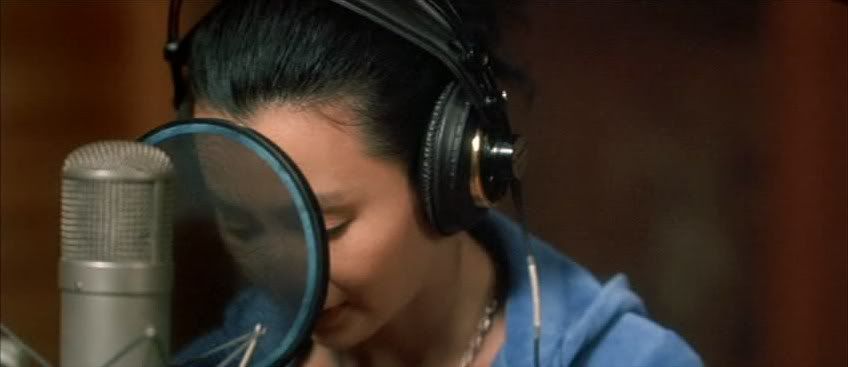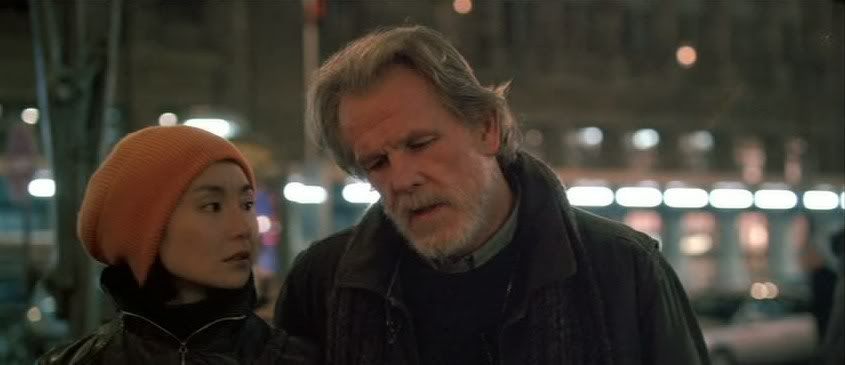
Olivier Assayas' Clean is a low-key, unassuming film that nevertheless accumulates great power as it traces the up-and-down trajectory of Emily Wang (Maggie Cheung), a former early-MTV-type celebrity and girlfriend of washed-up rock star Lee Hauser (James Johnston). When Lee dies of a drug overdose, Emily staggers on without him, struggling to get her life back in order, to get off the drugs, adjust to normal life, and get back her son Jay (James Dennis), who's living with Lee's parents, Albrecht (Nick Nolte) and Rosemary (Martha Henry). Obviously, this is a story with intense and unsettling emotional stakes, but Assayas, typically, resists the impulse for melodrama, instead crafting a quiet and gently paced film that puts the emphasis on day-to-day life and the ordinary dramas of getting through each day in the wake of a life-shaking tragedy.
It's a film all about grief and guilt, and Assayas places Cheung's subtle performance front and center. Her expressive face, surrounded here by a halo of frizzy, punky unwashed hair, conveys the full range of her feelings as she struggles to make a new life without Lee, and without the aura of low-level fame that she was accustomed to. Lee's old rock star friends and associates — including drum-and-bass producer Tricky, one of several real musicians playing himself — now want nothing to do with her, and the press eulogizes Lee with more praise than he ever got in life while condemning Emily as the cause of his addiction and death. The patterns are familiar: dead rock stars suddenly become geniuses, while rock stars' girlfriends are always blamed, like Yoko Ono, for all the ill that befalls the men. Assayas is taking all the old rock n' roll clichés and digging into them, trying to reveal the less sensational human truths behind the music magazine headlines and rhapsodic essays. In one scene, Lee's parents, reviewing a reissue project of their son's music, read the CD liner notes which portray their son as a romantically tragic figure, self-destructive and tormented. They lament that these notes present such a one-dimensional portrait of a man who they knew had so much more to him, and then they laugh, because they know that Lee would laugh, too, bemused to be turned into such a poetic martyr.
It's a striking scene because it's unlike almost anything else that usually appears in cinematic portrayals of rock n' roll tragedy. The rock star dying of a drug overdose, leaving behind a strung-out girlfriend and a son neither of them could ever deal with? This is familiar. The rock star's parents sighing over the excessive imaginations of music journalists is something that only Assayas would think to include. Just as Irma Vep dealt with questions of identity and race by wandering around the fringes of a film set, Clean lingers at the edges of the music industry, populated with people who were once famous or had mildly famous bands or are known in certain insular scenes. Emily is peripheral to this milieu herself, not quite famous on her own merits, sometimes remembered for a TV show she had, mostly remembered, unfairly but predictably, as the woman who destroyed a rock star's life. Surrounded by phoniness and spite — Rivette regular Jeanne Balibar appears as a former friend who's too self-absorbed to help — Emily is trying to clean up, to readjust, taking low-level jobs in restaurants and clothing stores. Worst of all is an interview with a store manager who remembers her TV show, making her attempt to get a job as a salesgirl especially humiliating. When she returns to her friend Elena (Béatrice Dalle) after this interview, she admits that she isn't sure if this new life, this attempt to get a normal job and clean up, is better or worse than being a junkie — it's a devastating admission.

Though the film's focus remains almost entirely on Emily, Assayas occasionally cuts away to Lee's parents, who are also dealing with the aftermath of Lee's death and trying to raise his son. Nick Nolte delivers a quiet but intense performance as Albrecht, a gruff man whose wife is sick and, he begins to suspect, dying. He sits in a hospital by her side, waiting through endless barrages of tests, or in a hotel room with the precocious Jay. As Albrecht confesses to Martha, he'd never paid much attention to his own son when he was a child, because he doesn't know what to do with young children. He is a somewhat emotionally aloof man, his face often unreadable behind his beard, his raspy voice seldom betraying much of what he's feeling. But he's clearly shaken by his wife's slow decline, and by the prospect of being left alone with his grandson, so he reaches out to Emily, trying to get her to clean up, to reforge the broken connection with her son.
It's a touching story, and Assayas tells it with simple grace and not even a hint of sentimentality or falseness. As is often the case in his films, the story hops around the globe, from Canada to London to Paris to San Francisco, with his cinematography giving a distinct feel to each place even as his habit of cross-cutting between countries and continents conveys the ease of international travel, of a community of people whose human connections and family bonds transcend borders. It is perpetually nighttime in Assayas' Paris, moody and lit with the golden glow of street lamps and traffic, and he contrasts this romantic urban image with the institutional austerity of a London hospital, the forlorn and decaying motels of a fading rock tour passing through a small town, the noise and chatter of a crowded club, everyone talking and drinking while the band plays. Assayas has always had a real feel for music and performance, and the film's soundtrack is memorably scattered with snippets of Brian Eno, shoegazer ballads, and Maggie Cheung singing her own songs that sound like slightly accented Sonic Youth. Assayas films several musicians performing, most memorably an appearance by the Canadian indie rock outfit Metric: the camera glides seductively up and down the body of singer Emily Haines, admiring the short hem of her skirt and the legs below it, capturing the jittery, sexy energy of a rock star performing, projecting her whole body into the pulsing post-punk rhythms of the band's song "Dead Disco."
In the film's final scenes, Emily records a song, while the camera drifts in elegant half-circles around her, her face often hidden or half-hidden behind a microphone. She gets an ambivalent reaction from her producer, chats with her collaborator, cries and then skips out onto a patio outside, smiling as the camera pans up and away from her, taking in a hazy view of San Francisco's hills, the bridge in the distance. It's a perfect encapsulation of the film's emphasis on life slowly, steadily going on, with heartache and happiness tangled together, modest joy and lingering pain coexisting in equal measures.

2 comments:
I remember seing this film full of subtilities directed by Assayas (it was the first of his films I ever saw) I found it "true" and always near the "clichés" without falling directly into them while portraying artists especially musicians.
Your review evoked memories of this film and clarifies them while giving me the interest of revisiting it.
Note:I did not remembered the band Metric and their performance of "Dead Disco" a song (and a band) that shuffles on my iPod once in a while.
Agreed, Michaël, this film definitely skirts some familiar clichés but always has a unique perspective or twist on them, not regurgitating the usual rock star stories so much as commenting on them.
Post a Comment